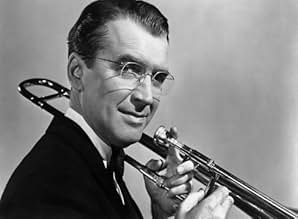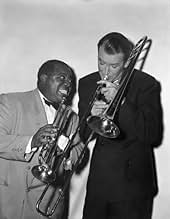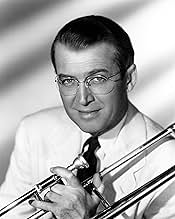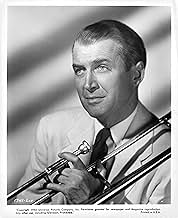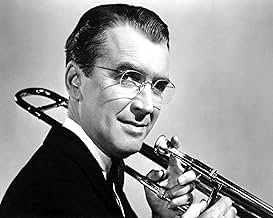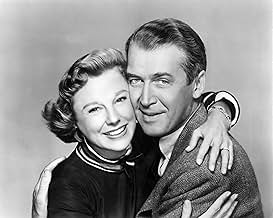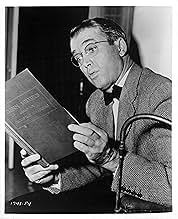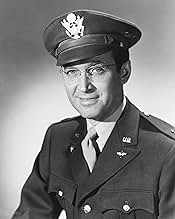AVALIAÇÃO DA IMDb
7,3/10
10 mil
SUA AVALIAÇÃO
Adicionar um enredo no seu idiomaBiography of bandleader Glenn Miller from his beginnings to his death over the English Channel in December 1944.Biography of bandleader Glenn Miller from his beginnings to his death over the English Channel in December 1944.Biography of bandleader Glenn Miller from his beginnings to his death over the English Channel in December 1944.
- Direção
- Roteiristas
- Artistas
- Ganhou 1 Oscar
- 1 vitória e 7 indicações no total
Harry Morgan
- Chummy
- (as Henry Morgan)
Katherine Warren
- Mrs. Burger
- (as Katharine Warren)
- Direção
- Roteiristas
- Elenco e equipe completos
- Produção, bilheteria e muito mais no IMDbPro
Avaliações em destaque
Glenn Miller's rise to fame and the tragedy that took him from us at the height of his career makes for a wonderfully entertaining film.
This film is rich because of the wonderful performances of James Stewart as the band leader and June Allyson, the latter was just made for the picture. She captures the depth of a devoted wife and we all can just cry with her when her happiness was ended so suddenly.
Naturally, the supporting cast of musicians and scenes with Frances Langford, Louis Armstrong and Gene Krupa are just wonderful.
We view Miller from humble beginnings to stardom, the old-fashioned Hollywood Way-he earned it by hard work and perseverance as he went through life looking for that sound.
My main flaw with this film. Just like Miller's life, it ended too suddenly. It could have gone on and on while we all danced the night away in tribute to this find musician.
Ever Harry Morgan's tear in the end tells you what this was all about.
This film is rich because of the wonderful performances of James Stewart as the band leader and June Allyson, the latter was just made for the picture. She captures the depth of a devoted wife and we all can just cry with her when her happiness was ended so suddenly.
Naturally, the supporting cast of musicians and scenes with Frances Langford, Louis Armstrong and Gene Krupa are just wonderful.
We view Miller from humble beginnings to stardom, the old-fashioned Hollywood Way-he earned it by hard work and perseverance as he went through life looking for that sound.
My main flaw with this film. Just like Miller's life, it ended too suddenly. It could have gone on and on while we all danced the night away in tribute to this find musician.
Ever Harry Morgan's tear in the end tells you what this was all about.
Produced nine years after his death this is Hollywood's obituary of swing era legend Glenn Miller. Essentially a musical told around the story of his struggle to achieve musical stardom. A film that will appeal to all lovers of 1930s swing music and Glenn Miller in particular. A film also for James Stewart fans. Casting the gangling Stewart as Miller was a huge gamble that succeeded; if it had failed so would have the film. This success was due to Anthony Mann's undoubted ability as a director. The Mann-Stewart combination had already proved itself but here both were on unfamiliar territory. Mann's forté was the outdoor adventure while Stewart was a pre-war light comedy star still trying to find a new identity. Mann had earlier directed Stewart in Winchester '73(1950)and the two were to go on to further success with The Far Country (1954) and The Man from Larramie (1955). He excels himself in bringing out previously unknown talents in Stewart that make this a career best for the Actor. Clad simply in a military raincoat, a trombone to his lips and sporting a USAAF officer's peaked cap he requires no further make-up to pass himself off as the wartime Miller. Among the lesser credits is the name of an unknown Henry Mancini but this was to be his big break as at the young age of 22 he was to become an Oscar nominee (jointly with Joseph Gershenson) for musical scoring. Before joining Universal Mancini had been a piano player and arranger with the post-war "Glenn Miller Orchestra", by using musicians from this band, made up mainly of sidesmen from Miller's own bands, Mancini ensured an authentic re-creation of the seductive Miller sound that had enchanted teenagers in the years leading up to the war. Regrettably an argument with the Miller Estate prevented the participation of saxophonist Ted Beneke, who had earlier led the post-war band and was renowned for his performance of Chattanoga Choo-Choo in"SunValley Serenade" (1941). The fidelity of the sound track of Miller's music won the film an Oscar for best sound recording of a musical. After a ponderous start the film picks up pace in apparent tune with Miller's success until the last reel is a non-stop performance of Miller standards. Miller was supported throughout by his wife, Helen, sympathetically played by a cuddlesome June Allyson, who ceaselessly encouraged him when all seemed to have failed. When news of his death reaches her one immediately feels her sadness in her loss and spontaneously grieves with her. Get your hankies out! A few minor lapses mar an otherwise competent production; Miller is incongruously seen in his army raincoat an a glorious summer's day conducting his wartime band at an outdoor concert in England just after D-day while the audience and band are in standard military attire; a continuity lapse shows a German flying bomb attack taking place before D-day, 6th June, whereas the first one did not reach England until the following week. Miller's loss at the peak of popularity, flying in advance of his band to make arrangements in Paris for his Christmas concert, ensured his enduring fame. As his plane and body were never recovered the mystery of his death has added to the legend. Only in the last decade have military historians been able to piece together his last moments and pinpoint where the plane came down. Whilst crossing the English Channel in dense fog the plane, which relied entirely on a compass for navigation, wandered off course and entered a prohibited area reserved for returning Allied bombers to drop any left over bombs; it was one of these that hit the plane so bringing to its end the life of one Glenn Alton Miller. Anthony Mann's deliberately abrupt end to the film comes as a jolt and dramatically conveys the unexpected loss of the patriotic Miller in his prime - the touch of the Master. A film that has stood the test of time; part fact, part fiction, it will remain the definitive tribute to the man and his music. Good wholesome entertainment for the whole family and a must for Stewart and Miller fans.
"The Glenn Miller Story" appears on cable-TV from time to time. It is an historically accurate piece about a beloved man whose music defined an era.
Miller is portrayed as a gracious and kind man -- an officer and a gentleman. We see Jimmy Stewart's affectionate portrayal of this simple man who spent his short musical career searching for a particular sound. The results got the whole world dancing to his new beat: Swing! The music in this movie will surely get you on your feet!
The driving force in Glenn Miller's life was his love for his wife, Helen, amicably played by June Allyson.
A "must-see", movie classic. Be sure to bring a hanky!
Miller is portrayed as a gracious and kind man -- an officer and a gentleman. We see Jimmy Stewart's affectionate portrayal of this simple man who spent his short musical career searching for a particular sound. The results got the whole world dancing to his new beat: Swing! The music in this movie will surely get you on your feet!
The driving force in Glenn Miller's life was his love for his wife, Helen, amicably played by June Allyson.
A "must-see", movie classic. Be sure to bring a hanky!
The Glenn Miller Story is a biographical tribute to a man who is always ranked as one of the great swing bandleaders of the late thirties to middle forties era. It is indeed fortunate that when James Stewart puts a pair of glasses on, he does actually look like the real Glenn Miller. I don't know what Helen Miller looked like, but I'm sure she was as supportive to her husband as June Allyson was to her screen hubby.
The Miller story begins with Stewart and pal Harry Morgan on the road as musicians. Stewart plays a slide trombone and has ideas of how the orchestra should sound as a whole. He spends a lot of time writing arrangements for the entire band. When they're not done right as is graphically shown in a scene when Miller's famous Moonlight Serenade is performed, he decides to form his own band.
He's still looking for that particular sound that he wants his orchestra to have and he chances on it in one of the more interesting scenes in the film. Swing fans when they hear it will recognize it as the genuine Glenn Miller.
One glaring fault for purists though is while the instrumentals are performed nicely, the vocal part of the Miller band is left out of the film. For whatever reason singers, Ray Eberle, Marian Hutton (Betty's sister)and most of all Gordon "Tex" Beneke are not in the film. In fact Chattanooga Choo Choo, Beneke's most famous number, is performed in the film by Frances Langford as herself.
My favorite scene in the film is the nightclub scene in Harlem on the Miller wedding night. June was definitely a patient wife, but hey, if you got a chance to jam with Louis Armstrong, you drop EVERYTHING for that opportunity. Gene Krupa and other top jazz musicians are in that scene with Stewart and Satchmo, making it a real treat for jazz aficionados.
For American music we are indeed fortunate that Glenn Miller succeeded in his quest for the right sound which is so lovingly captured in this film.
The Miller story begins with Stewart and pal Harry Morgan on the road as musicians. Stewart plays a slide trombone and has ideas of how the orchestra should sound as a whole. He spends a lot of time writing arrangements for the entire band. When they're not done right as is graphically shown in a scene when Miller's famous Moonlight Serenade is performed, he decides to form his own band.
He's still looking for that particular sound that he wants his orchestra to have and he chances on it in one of the more interesting scenes in the film. Swing fans when they hear it will recognize it as the genuine Glenn Miller.
One glaring fault for purists though is while the instrumentals are performed nicely, the vocal part of the Miller band is left out of the film. For whatever reason singers, Ray Eberle, Marian Hutton (Betty's sister)and most of all Gordon "Tex" Beneke are not in the film. In fact Chattanooga Choo Choo, Beneke's most famous number, is performed in the film by Frances Langford as herself.
My favorite scene in the film is the nightclub scene in Harlem on the Miller wedding night. June was definitely a patient wife, but hey, if you got a chance to jam with Louis Armstrong, you drop EVERYTHING for that opportunity. Gene Krupa and other top jazz musicians are in that scene with Stewart and Satchmo, making it a real treat for jazz aficionados.
For American music we are indeed fortunate that Glenn Miller succeeded in his quest for the right sound which is so lovingly captured in this film.
James Stewart in one of his best roles of the 1950s playing the late bandleader in the embellished story of his life; June Allyson plays his wife one of her best roles and I believe one of her personal favourites.
Watching the real Miller in Orchestra Wives' and then watching this, Stewart is really a revelation in this role. All the hits of the band are represented Moonlight Serenade, In The Mood, Tuxedo Junction, Chattanooga Choo-Choo, Pennsylvania 65000. Some artistic licence has been taken but the whole is funny, celebratory, and at the end fairly touching. One of the best Hollywood biopics, right in the middle of a glut of them (Love Me or Leave Me, With a Song In My Heart, The Eddy Duchin Story, Night and Day, Words and Music, Three Little Words ).
Watching the real Miller in Orchestra Wives' and then watching this, Stewart is really a revelation in this role. All the hits of the band are represented Moonlight Serenade, In The Mood, Tuxedo Junction, Chattanooga Choo-Choo, Pennsylvania 65000. Some artistic licence has been taken but the whole is funny, celebratory, and at the end fairly touching. One of the best Hollywood biopics, right in the middle of a glut of them (Love Me or Leave Me, With a Song In My Heart, The Eddy Duchin Story, Night and Day, Words and Music, Three Little Words ).
Você sabia?
- CuriosidadesJames Stewart took trombone lessons in order to actually play during scenes where Glenn Miller is seen performing with his orchestra. However, while learning from his tutor, Stewart's attempts at practicing the instrument made such horrible noises that the teacher reportedly went home in a rage every night to his family. It was decided that Stewart would accurately mime the motions of playing (especially apparent during the performance of String of Pearls) while his trombone tutor Joe Yukl did the actual playing.
- Erros de gravaçãoMiller's famed swing instrumental of "Little Brown Jug" is depicted in the closing scene as a "special arrangement" Glenn created for a Christmas 1944 radio broadcast by Miller's AAF Band from Paris. In fact, it was one of the real Miller Band's first bona fide hits in 1939, arranged by the recently hired Bill Finegan, who became, along with arranger Jerry Gray, two of the key behind-the-scenes craftsmen that helped mold Miller's civilian band into the enduring commercial and artistic powerhouse it became.
- Citações
[repeated line]
Helen Burger: Honestly!
- Versões alternativasMost current prints in circulation are the slightly shortened 113-minute 1959 re-release version.
- ConexõesFeatured in AFI Life Achievement Award: A Tribute to James Stewart (1980)
- Trilhas sonorasBasin Street Blues
(uncredited)
Written by Spencer Williams
Performed by Louis Armstrong and Gene Krupa
Principais escolhas
Faça login para avaliar e ver a lista de recomendações personalizadas
Detalhes
Bilheteria
- Faturamento bruto mundial
- US$ 994
- Tempo de duração1 hora 55 minutos
Contribua para esta página
Sugerir uma alteração ou adicionar conteúdo ausente




